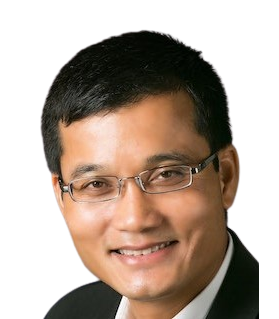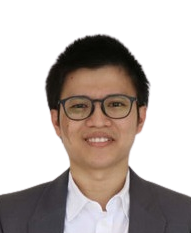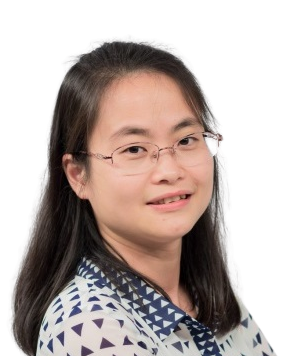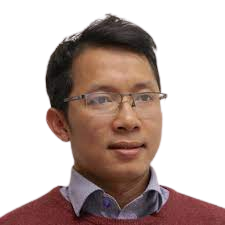 Prof. Minh N. Do, University of Illinois at
Urbana-Champaign, USA
Prof. Minh N. Do, University of Illinois at
Urbana-Champaign, USABiography: Minh N. Do is Thomas and Margaret Huang Endowed Professor at the Department of Electrical and Computer Engineering, University of Illinois at Urbana-Champaign. He was born in Thanh Hoa, Vietnam in 1974. He received the B.Eng. degree in Computer Engineering from the University of Canberra, Australia in 1997, and the Dr.Sci. degree in Communication Systems from the Swiss Federal Institute of Technology Lausanne (EPFL), Switzerland in 2001. Since 2002, he has been on the faculty at the University of Illinois at Urbana-Champaign, where he is currently the Thomas and Margaret Huang Endowed Professor in Signal Processing & Data Science in the Department of Electrical and Computer Engineering, and holds affiliate appointments with the Coordinated Science Laboratory, the Beckman Institute for Advanced Science and Technology, the Department of Bioengineering, and the Department of Computer Science. His current research interests include signal processing, computational imaging, machine perception, and data science. He received a Silver Medal from the 32nd International Mathematical Olympiad in 1991, a University Medal from the University of Canberra in 1997, a Doctorate Award from the Swiss Federal Institute of Technology Lausanne in 2001, and a CAREER Award from the National Science Foundation in 2003. He co-authored on two papers with Arthur L. da Cunha and Ha T. Nguyen that received Best Student Paper Awards at the IEEE International Conference on Acoustics, Speech, and Signal Processing (ICASSP) in 2005, a paper with Yue Lu that received a Most Innovative Paper Award at the IEEE International Conference on Image Processing (ICIP) in 2006, and a paper with Yue Lu that received a Student Paper Award at ICIP in 2007. He received a Young Author Best Paper Award from the IEEE Signal Processing Society in 2008 for a paper with Martin Vetterli. He was named a Beckman Fellow at the Center for Advanced Study, UIUC in 2006, and received a Xerox Award for Faculty Research, College of Engineering, UIUC, in 2007. He was a member of the IEEE Signal Processing Theory and Methods and Image, Video, and Multidimensional Signal Processing Technical Committees, and an Associate Editor of the IEEE Transactions on Image Processing. He was elevated as an IEEE Fellow in 2014 for contributions to image representation and computational imaging. He has contributed to several tech-transfer efforts, including as a co-founder and CTO of Personify and Chief Scientist of Misfit. During 2020-2021 he served as the Vice Provost, and then continues as Honorary Vice Provost, for VinUniversity, the first private, not-for-profit Vietnamese university established based on international standards. |
 Prof. Theerawit Wilaiprasitporn, Vidyasirimedhi Institute
of Science & Technology, Thailand
Prof. Theerawit Wilaiprasitporn, Vidyasirimedhi Institute
of Science & Technology, ThailandBiography: Theerawit Wilaiprasitporn (Member, IEEE) is with the School of Information Science and Technology (IST), Vidyasirimedhi Institute of Science & Technology (VISTEC), Thailand. He received the Ph.D. degree in engineering from the Graduate School of Information Science and Engineering, Tokyo Institute of Technology, Tokyo, Japan, in 2017. The Japan Society for the Promotion of Science (JSPS) funded his Ph.D. research. He is currently an Assistant Professor with the School of Information Science and Technology, Vidyasirimedhi Institute of Science and Technology, Rayong, Thailand, where he is also a Co-Principal Investigator (Co-PI) of the Bio-Inspired Robotics and Neural Engineering Laboratory. He had been a PI of ten external-funded projects. He has published more than 20 IEEE journal articles/transactions within the first four years of his early career (2019–2021). His research interests are biomedical signal processing, brain–computer interfaces, and artificial intelligence in healthcare. Dr. Wilaiprasitporn is an Associate Editor of the IEEE Sensors Journal and the Track Chair of IEEE Sensors for the term 2021–2022. |
 Prof. Phi Le Nguyen, Hanoi University of Science and
Technology, Vietnam
Prof. Phi Le Nguyen, Hanoi University of Science and
Technology, VietnamBiography: Phi Le Nguyen is currently working at the School of Information and Communication Technology, Hanoi University of Science and Technology. She received her B.E. and M.S. degrees from the University of Tokyo in 2007 and 2010, respectively. She received her PhD degree in informatics from National institute of Informatics, Japan in 2019. Her major is networking which includes optimization of network protocols, optimization of network deployment, resource management and performance analysis of both wired and wireless networks. Currently, she is focusing on exploiting machine learning to enhance network performance. |
 Prof. Hieu H. Pham, VinUniversity, Vietnam
Prof. Hieu H. Pham, VinUniversity, VietnamBiography: Hieu H. Pham is with College of Engineering and Computer Science & VinUni-Illinois Smart Health Center, VinUniversity. He is also a Research Fellow cum Associate Director at VinUni-Illinois Smart Health Center. He received his Ph.D. in Computer Science from the Toulouse Computer Science Research Institute (IRIT), University of Toulouse, France, in 2019. Previously, he earned the Degree of Engineer in Industrial Informatics from Hanoi University of Science and Technology (HUST), Vietnam, in 2016. His research interests include Computer Vision, Machine Learning, Medical Image Analysis, and their applications in Smart Healthcare. He is the author, co-author of 30 scientific articles appeared in about 20 conferences and journals such as Computer Vision and Image Understanding, Neurocomputing, Nature Scientific Data, International Conference on Medical Image Computing and Computer-Assisted Intervention (MICCAI), Medical Imaging with Deep Learning (MIDL), IEEE International Conference on Image Processing (ICIP), and IEEE International Conference on Computer Vision (ICCV), Asian Conference on Computer Vision (ACCV). He is also currently serving as Reviewers for MICCAI, ICCV, CVPR, IET Computer Vision Journal (IET-CVI), IEEE Journal of Biomedical and Health Informatics (JBHI), and Nature Scientific Reports. Before joining VinUniversity, Dr. Hieu worked at Vingroup Big Data Institute (VinBigData) as a Research Scientist and Head of the Fundamental Research Team. With this position, he led several research projects on Medical AI, including collecting various types of medical data, managing and annotating data, and developing new AI solutions for medical analysis. More details about his research and teaching works are available at https://huyhieupham.github.io/ |
 Prof. Cuong Do, VinUniversity, Vietnam
Prof. Cuong Do, VinUniversity, VietnamBiography: Cuong Do is with College of Engineering and Computer Science & VinUni-Illinois Smart Health Center, VinUniversity. He obtained a BS in electronics from the Vietnam National University, Hanoi, in 2004. He received MEng in Electronics and Semiconductor from Chungbuk National University, Korea, in 2007 and his PhD in Electronics Engineering from Cork Institute of Technology, Ireland, in 2012. His PhD dissertation focuses on the development of adaptive control methods for improving the performance and reliability of MEMS switches. The work is in collaboration with Analog Devices Inc. From 2013 to 2017, Dr. Cuong was a research associate in the Engineering Department, University of Cambridge. In Cambridge, he combined both pieces of knowledge in MEMS and CMOS fields to develop an ultra-low power, high sensitive strain sensor in Cambridge. Based on this work, two industrial fundings from IHI Corp., Japan, and 8Power Ltd., UK were secured. He also led a group of graduate students in their work on projects such as energy harvester systems, MEMS nonlinearity, and wireless sensor networks. |
 Prof. Huy Phan, Queen Mary University of London, UK
Prof. Huy Phan, Queen Mary University of London, UKBiography: Huy Phan is with the School of Electronic Engineering and Computer Science, Queen Mary University of London (UK). He is also a Turing Fellow at the Alan Turing Institute (UK) and an Academic Fellow at the Digital Environment Research Institute, Queen Mary University of London. He co-leads the Machine Listening Lab at the Centre for Digital Music, Queen Mary University of London. Before that, he was a Lecturer at the School of Computing, University of Kent (UK) and a postdoctoral researcher in the CIBIM lab at the Department of Engineering Science, University of Oxford (UK). He received the PhD degree (Dr.-Ing. in German system) with summa cum laude from the Institute for Signal Processing, University of Lübeck (Germany) and his PhD thesis was awarded the Bernd Fischer Award for the best PhD thesis from the University of Lübeck in 2018. In 2021, Prof. Huy Phan was awarded IEEE-EMBS Best Paper Award 2019-20. He investigates topics in the fields of machine learning/deep learning and signal processing. He is particularly interested in speech/audio analysis, biosignal analysis, and healthcare applications. |
 Prof. Huong Ha, International University, Vietnam
National University, Ho Chi Minh City, Vietnam
Prof. Huong Ha, International University, Vietnam
National University, Ho Chi Minh City, VietnamBiography: Lecturer of the School of Biomedical Engineering, International University, Vietnam National University, Ho Chi Minh City. Due to a family history of multiple members with mental disorders, Huong became intrigued in how the brain works, what molecules drive its functions and how they change when it gets dysregulated. During college, Huong studied molecular markers for devising diagnostic tests of cervical cancer. Following graduation, she further pursued this interest by working at the Oxford University Clinical Research Unit and investigating peripheral blood markers of HIV associated neurological disorders (HAND). At Stanford University, my PhD research was focused on understanding the molecular system related to autism and cellular and network deficits underlying epilepsy. Huong also created an efficient gene delivery technology and a universal brain tissue culture platform for research and drug discovery applications. Upon coming back to Vietnam and joining the International University as a lecturer, she established the Brain Health Lab and pursued several research projects to address mental health issues and cognitive-aging disorders in Vietnam. During the past few years, Huong had collaborated with experts and colleagues to build diagnosis platforms utilizing AI and MRI scans for automated detection of Alzheimer’s diseases, or using lab-on-chip assay to quantify stress-related hormones. For the future direction, she will continue to exploit the potential of these tools in neuro -science and -engineering, as well as develop novel products for clinical use. |